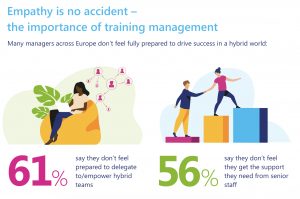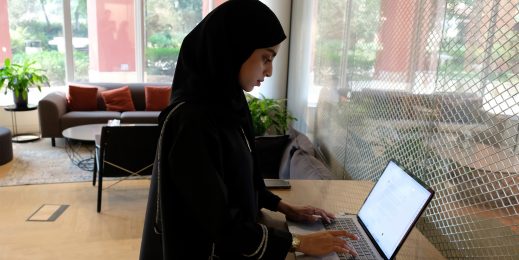
Empathy is key to unlocking success in a hybrid world of work
As the world went into lockdown earlier this year, workforces moved from office desk to kitchen table almost overnight – the initial short-term transition was remarkable.
Since then, research has shown that almost nine in ten leaders across Western Europe believe more hybrid ways of working are here to stay. Further, employees want more flexibility moving forward as well and don’t want to return to a 9-to-5, five days a week office-based existence.
So how do businesses ensure their employees are equipped to succeed in this new world of work?
It starts with one powerful human quality, empathy.
Research indicates that businesses whose team leaders look to understand the unique experiences of each team member, and help them protect work/life balance, have happier more engaged employees – and who are more innovative in their thinking.
Taking a walk in another’s shoes
It’s important to step back and appreciate the challenges thousands of workers have had in adjusting to remote and hybrid working
Dr. Michael Parke, Assistant Professor of Management at the Wharton School
The move to remote work has blurred the lines between work and home time. When you can’t walk out of the office and head home, when does the working day actually end? This lack of clear separation between our personal and professional lives impacts how we think about work.
Our research shows us that those leaders who are intentionally supporting their teams to establish work-life boundaries are almost twice as likely to have happier employees.

It’s reasonable to assume that happy teams tend to be more committed and engaged with the business, as well as more likely to stick around. So this outcome becomes particularly powerful when we pair it with another trait employees with leaders who protect their work life balance exhibit – a boost in innovative thinking.
Almost three quarters (72%) of leaders who protect  their teams’ work life balance highlight that their employees speak up and offer input, suggesting new ways to fix problems or offering views on how to improve how their business works on projects. That number drops to just over half (52%) for managers who stated that they were less protective oftheir employees’ time. Employees with managers who care about their time also report greater innovation (see graphic).
their teams’ work life balance highlight that their employees speak up and offer input, suggesting new ways to fix problems or offering views on how to improve how their business works on projects. That number drops to just over half (52%) for managers who stated that they were less protective oftheir employees’ time. Employees with managers who care about their time also report greater innovation (see graphic).
Sowing empathy into company culture
“Leaders must be more intentional about making sure people feel seen.“
Tony Crabbe, Business Psychologist and Author of ‘Busy: How to thrive in a world of too much’
With hybrid working removing some of the traditional pillars of office-based working, including the chance to connect face to face, it can be easy for employees to feel unmoored or left to their own devices. To help their remote teams continue to feel connected even while they’re apart, we see that effective leaders are intentional about the ways in which they check in with their team members.
Frequent touch-bases to share information, answer questions or just talk about how the other person is doing, are an important aspect of creating a supportive, empathic team culture. According to the research, 62% of workers with managers who actively help them protect their work/life balance also say these managers checked in on them frequently and proactively (vs. Only 48% among those with less-caring managers). These managers take greater care in expressing appreciation: 70% of workers with a protective manager say they feel recognized for their contributions – this drops to only 36% of those with manager who don’t protect employees work/life balance.
“In business settings, it’s been found that check-ins actually improve the quality of inclusion and decision making, and ultimately reduce the level of time it takes to complete tasks.“
Tony Crabbe, Business Psychologist and Author of ‘Busy: How to thrive in a world of too much’
Keeping pace with change
“For many businesses, their normal day-to-day reality has been based in a traditional office setting. So…it’s hard for many workers to quickly adapt to a new way of remote working. This includes managers and leaders who face the challenge of not only making sure core business objectives are met in times of increased uncertainty, but also ensuring their teams stay cohesive and engaged during a stressful time.”
Sarah Fisher, EMEA HR Lead, Microsoft
In addition to this, over half say they do not get the support they need from senior staff.
Like any skills needed to effectively manage a team, learning how to adjust leadership style and team  dynamic to the nuances of working remotely is a muscle that has to be developed.
dynamic to the nuances of working remotely is a muscle that has to be developed.
For senior leaders, the move to hybrid working is an opportunity to think about the learning and coaching opportunities they’re providing to managers – and to consider how those needs might continue to change over time.
“I hope we see hybrid as our moment to put humanity and innovation at the very heart of how we do business and at the very heart of our teams.”
Tony Crabbe, Business Psychologist and Author of ‘Busy: How to thrive in a world of too much’
For more information on empowering remote and hybrid work, please visit: https://aka.ms/rework














